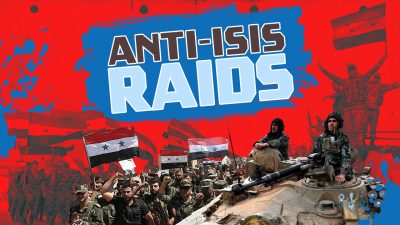Video: Syrian Army Fights ISIS in Homs. SDF Rejects Deal with Damascus

Clashes between government forces and ISIS terrorists have continued in central Syria since July 2, when ISIS cells stormed army positions in eastern Homs. In response, the Syrians supported by the Russian Aerospace Forces launched a security operation in the desert. Sporadic clashes and airstrikes were reported in the area over the next few days.
On July 4, ISIS terrorists even ambushed a unit of the Syrian Army in eastern Homs. The military reportedly lost contact with 25 soldiers in eastern Homs. As of July 6, their fate remains unclear. It’s likely that, members of the dispersed unit are now returning to their permanent positions in the province.
Pro-opposition sources claim that over the past week, at least 20 soldiers were killed in clashes with ISIS members. Pro-government sources do not provide details regarding army casualties, but say that government forces were able to destroy 3 ISIS vehicles and neutralize up to 10 ISIS members.
As the Syrian government fights ISIS on the western bank of the Euphrates, the US-led coalition conducted a raid against the terrorist group in the town of Husayn on the eastern bank of the Euphrates.
On July 5, US helicopters landed near the town and US forces assisted by members of the Kurdish-led Syrian Democratic Forces (SDF) detained at least 4 suspects.
Meanwhile, the SDF leadership declared that it does not see a possibility to reach a comprehensive political agreement with Damascus because the government wants to restore full control over the provinces of Deir Ezozr and Raqqa in the framework of such a deal.
SDF Commander-in-Chief Abdi Şahin better known by his nom de guerre Mazlum Abdi declined such a possibility claiming that the Kurdish-led group wants to keep control of all the areas that it has seized. Abdi is a member of the Kurdistan Workers’ Party (PKK), which seeks to create an independent Kurdish state in southern Turkey and, if it’s possible, include into it territories of northern Syria and northern Iraq. Therefore, such a position of the SDF leadership is not a big surprise.
In 2019, the Syrian Army came to northeastern Syria to rescue the SDF from the Turkish military advance when the group then abandoned by the US-led coalition needed it. However, after this, the Kurdish leadership once again turned back from the Syrian people selling its loyalty to Washington for weapons and a share of oil revenue from the US-controlled Syrian oilfields.
Infighting among Turkish-backed militant groups erupted in the provinces of al-Hasakah and Raqqa on July 3 and July 5. Tell Abyad, al-Yabisah and Ras al-Ain are the man hot points. At least 5 militants and several civilians were killed. The main source of tensions is the intra-militant competition for control of roads, agricultural lands and trade in a small chunk of area occupied by Turkey in northeastern Syria. The funding from Turkey decreased after the de-escalation of the conflict in this part of the country. So, Turkish-backed fighters are now looting the captured areas to obtain the needed financial resources.
*
Note to readers: please click the share buttons above or below. Forward this article to your email lists. Crosspost on your blog site, internet forums. etc.
SUPPORT SOUTHFRONT:
PayPal: [email protected], http://southfront.org/donate/ or via: https://www.patreon.com/southfront

